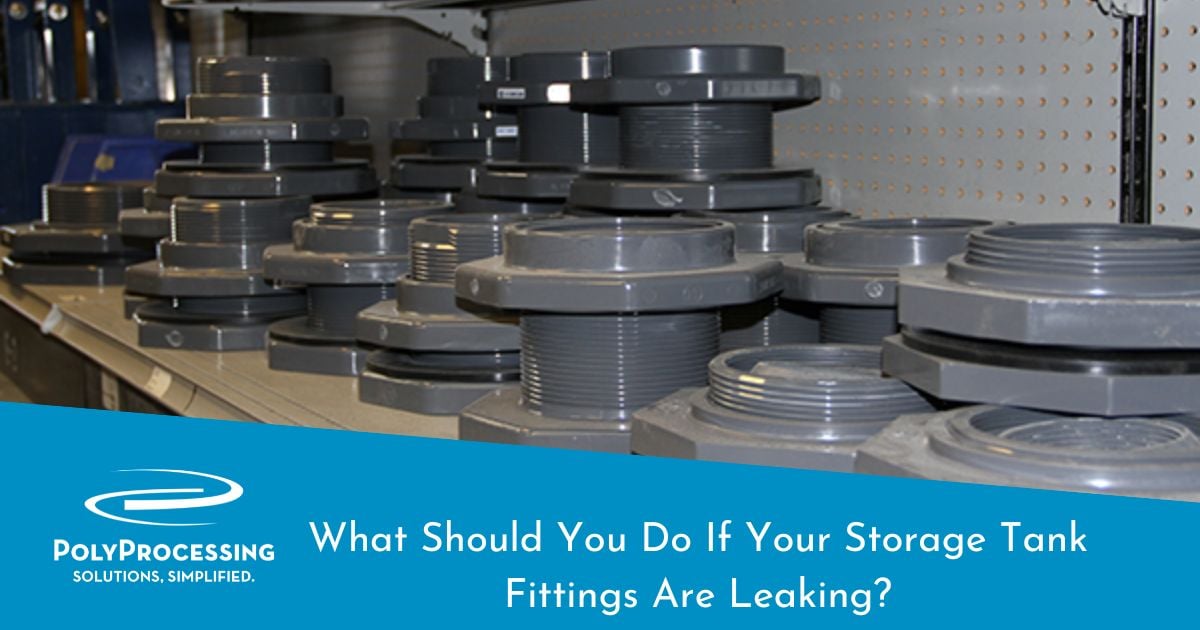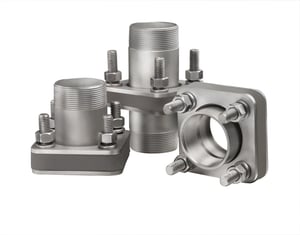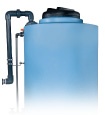What Should You Do If Your Storage Tank Fittings Are Leaking?
A leaky fitting is a serious issue that could put your employees in danger and cause damage to surrounding equipment. Leaked chemicals are a financial loss, and they can create serious environmental issues that plague your company for decades.
Our field service team will occasionally receive calls from concerned customers who need help fixing a leaking fitting on their chemical storage tank. It's not an issue that comes up often so many people are not sure what caused the issue or what to do next.

If your Poly Processing tank has a chemical leak, do a quick root cause analysis to determine if you need to call our field service team. If so, contact us immediately so that we can address the issue before any serious damage occurs.
Poly Processing cross-linked polyethylene tanks have unbeatable reliability and durability. You can effectively prevent leaking from tank fittings by taking the proper precautions.
Causes of Chemical Storage Fitting Leaks
T o stop a leak, the root cause of the leak must first be determined. In nearly all cases, the cause is linked to improper installation of the tank fittings. There are five common problems that can cause fittings to leak and three of them are related to improper installation.
o stop a leak, the root cause of the leak must first be determined. In nearly all cases, the cause is linked to improper installation of the tank fittings. There are five common problems that can cause fittings to leak and three of them are related to improper installation.
-
Plumbing that is too rigid
Rigid plumbing restricts the natural expansion and contraction of the tank. This can cause stress and could lead to leaks. -
Unsupported plumbing
Plumbing that’s not supported properly could also cause stress on connection points and increase the potential for leaks. -
Over-tightening of nipples and couplers
When threaded PVC accessories are over-tightened, the threads can become misaligned, compromising the seal and allowing leaks. -
Deterioration of gaskets
Like anything else made of rubber, and especially with exposure to chemicals, gaskets can eventually become brittle and may need to be replaced. Regular tank inspections will pinpoint weak and brittle fittings that should be addressed by a qualified service member before a leak develops. - Loose fittings
Over time, fittings can sometimes become loose. This is an issue that’s easy to resolve without calling our field service team. Check the torque on the nuts and bolts, and re-tighten them if necessary. Refer to the torque settings in our Installation Guide for correct torque ranges.
In addition to these considerations, you can minimize chemical exposure by adding a splash guard or shield. You should also install proper secondary tank containment to ensure that any leaked chemical can’t come in contact with equipment, personnel or the environment.
How can you fix it?
If your fittings or plumbing need to be replaced, don’t try to do it yourself. Call a Poly Processing Certified Field Service Technician or qualified pipefitter to replace your leaking fittings and make sure the installation is done properly.
Contact the Poly Processing Field Service Team for a quick fix over the phone, or to arrange for an expert to come onsite. We’ll make sure your tank gets the right fix for a long-term operation that is safe and reliable.
- November 12, 2018
- Topics: Fittings and Accessories
About Poly Processing
Posts By Topic
Tech Talk Podcast Episodes
Subscribe By Email
Recent Posts
- Why Cycling Causes Tank Failure: Tips for Prolonging Tank Life
- Small Changes in Tank Selection for Big Long-Term Cost Benefits
- NSF Certification vs. FDA Compliance: Understanding Chemical Tank Standards
- Why Chemical Storage Tank Wall Thickness Matters and How to Get It Right
- The Best of 2025 - Top 5 Chemical Storage Blogs
Tank Configurator

Find the recommended tank and system components for your chemical storage challenge.
Configure a Tank Package



